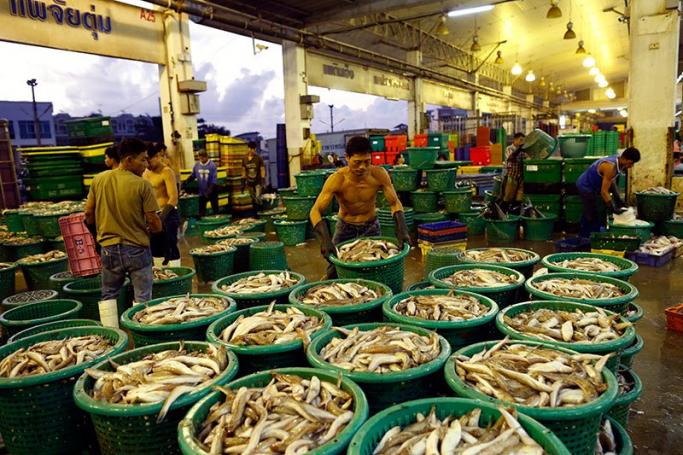More than 2,000 migrant workers at a major Thai seafood exporter called Monday for higher wages and better working conditions, a rare stand in a country where foreigners are banned from forming trade unions.
Leaders representing 2,243 Myanmar employees at processing factories owned by Sea Value Group submitted a petition "requesting increased welfare benefits and change of work conditions", the Migrant Worker Rights Network said in a statement.
"The main demands are for increased bonus, increased night shift allowance, increased incentives," Andy Hall, an activist with the network, told AFP, noting the workers had previously won concessions on reducing recruitment fees.
Thailand is the world's third largest seafood exporter but the industry has been dogged by allegations of rights abuses and cheap labour in its fishing fleets and many food processing factories.
The sector is mainly staffed by poor migrant workers from Myanmar, Laos and Cambodia.
But their treatment has caused increased jitters among international buyers, especially in Europe and the United States where consumers are demanding better ethical sourcing of food.
According to its website, Sea Value Group's factories process more than 1,000 tonnes of tuna, sardine, mackerel and other fish a day, much of it exported to Europe and the US.
A spokeswoman for Sea Value Group declined to comment on the demands.
The website says the company's products "meet and exceed consumer expectations with good manufacturing practices, ethical standards and promoted industrial and environmental sustainability".
Thailand's migrant workers have become increasingly vocal in recent years in pressing for better pay and conditions. But doing so can be fraught with risk.
Many employees remain undocumented, despite recent government efforts to register all migrant labourers.
That leaves many migrants vulnerable to abusive employers and traffickers.
Thailand also does not allow migrant workers to form trade unions. Many who do complain find themselves out of work or even prosecuted under defamation laws.
Last year a group of Myanmar chicken factory workers alleged they were underpaid and forced to work 20-hour days.
The company denied the allegations and the workers found themselves charged with defamation and arrested for theft of the time cards they used to prove their long work days.
Last September Hall himself was convicted of criminal defamation and given a suspended jail sentence over a report alleging abuses in Thailand's lucrative fruit industry. He has since left the country.
But Thailand's poor labour reputation is starting to catch up with it.
The European Union has threatened to ban all its seafood products unless the military government tackles rampant illegal fishing among its fleets.
The junta has vowed to clean up the industry.
© AFP
You are viewing the old site.
Please update your bookmark to https://eng.mizzima.com.
Mizzima Weekly Magazine Issue...
14 December 2023
Spring Revolution Daily News f...
13 December 2023
New UK Burma sanctions welcome...
13 December 2023
Spring Revolution Daily News f...
12 December 2023
Spring Revolution Daily News f...
11 December 2023
Spring Revolution Daily News f...
08 December 2023
Spring Revolution Daily News f...
07 December 2023
Diaspora journalists increasin...
07 December 2023
Landslides kill 12 as monsoon batters refugee camps












